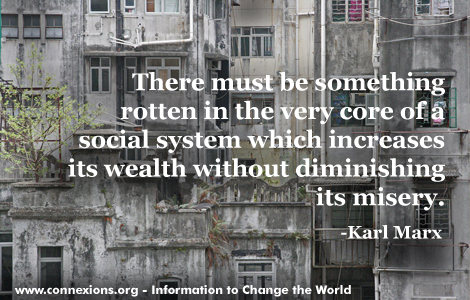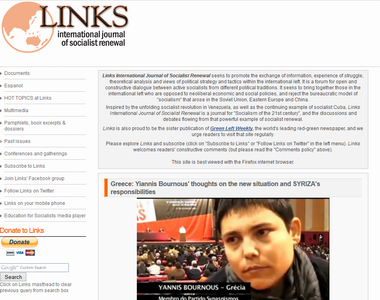Other Voices: The Connexions Newsletter
November 11, 2017
This Issue: Left Parties
“There is no alternative.” That is capitalism’s message in the neo-liberal era. The rich keep getting richer and richer, millions of people are unemployed, millions more are trying to survive on precarious, marginal, and part-time work, hundreds of millions are without health care, housing, education, or clean water. Environmental collapse is increasingly likely, masses of people are fleeing wars and economic disasters, nuclear war is a real danger. And all that the corporate elite, the corporate media, and the mainstream political parties have to offer is their insistence that there is nothing we can do about it: there is no alternative.
In those countries where some version of liberal democracy still exists, an ever-increasing percentage of the population has stopped participating in elections where none of the parties offer an alternative. The parties that used to offer something for working people – the various versions of social democracy – have been absorbed into the neo-liberal consensus, and where they form governments, alone, or in coalition with other neo-liberal parties, they enforce the same neo-liberal program.
The political vacuum left by the mainstream parties has opened up space for new parties and political movements to emerge on both the right (see Other Voices October 9, 2017) and the left. In recent years, a number of left parties have emerged out of mass movements in countries like Spain (Podemos), Germany (Die Linke), and Greece (Syriza). In Latin America, in the last two decades, left movements or parties have formed governments in Venezuela, Bolivia, Brazil, and Uruguay. In Britain, exceptionally, the emergence of a socialist left has happened within the mainstream Labour Party, inspired by Jeremy Corbyn’s articulation of a socialist vision that attracted enormous numbers of new members to the party. In the United States, Bernie Sanders’ campaign also showed that a politician who calls himself a socialist can inspire millions of people, though Sanders’ insistence on channelling their energies into the Democratic Party undermined the possibilities for a new political movement that his campaign could have opened up.
What these new left parties/movements have in common is a strategy of engaging in grassroots organizing and also running in elections. They all describe themselves as socialist, though in many cases their programs are more reminiscent of what social democrats used to advocate decades ago: reforms that would tame and manage capitalism rather than abolish it. Their ultimate vision may be a world without capitalism, but their immediate proposals are more modest and incremental, though still significantly to the left of the neo-liberal consensus.
The ambiguities and contradictions in their goals are in large part attributable to the fact that, being based on social movements, they are therefore coalitions incorporating diverse points of view, some radical, some less so.
A second tension is one that emerges in every leftwing political movement that engages in elections. Those who are elected to office, and the party/parliamentary apparatus that surrounds them, are almost inevitably absorbed into the narrow world of elections and parliamentary politics. This is all the more true if a left party manages to attain office.
Indeed, the experience of the left parties to emerge in the last two decades shows that the real test, and the real danger, comes when a left party forms a government, or becomes part of a coalition government.
A coalition by definition requires the parties participating in it to sacrifice parts of their programs. When a socialist party enters a coalition with a non-socialist party, it is always on the basis that the socialist parts of its program are set aside in exchange for including some of the specific reforms it wants in the coalition government’s agenda. The prospect of achieving a share of political office in a coalition can be extremely tempting, but for a left party the result is almost always a political disaster.
The dangers and challenges of achieving office are most starkly posed when a left party comes to power in its own right. Being in government is not the same as being in power, as it soon comes to learn. Real power is wielded by the capitalist class, those who control the levers of finance. When they don’t like the results of an election, they move their money out of the country, and international money markets institute a de facto boycott of the disobedient country. International institutions, such as the European Union and the International Monetary Fund, as well as the biggest and most powerful international institution of all, the American Empire, bring enormous pressure to bear. In this, they have the help of a ‘fifth column’ within the country: the corporate sector (including the corporate media), as well as significant parts of the state apparatus, such as the senior bureaucracy, the police, and the military.
If a left party is to have any hope of surviving and carrying out its program, it has to have a clear understanding of the obstacles it will face, and a strong determination to meet them head on. Even more importantly, it can only succeed if it remains the expression of a broad-based social movement. An isolated left government has no chance. A movement of millions of people which is committed to an ongoing process of social transformation can sustain a left government, even as such a government can help to achieve the goals of the movement.
In this issue of Other Voices, we look at the experiences of a number of left parties. The Connexions Subject Index provides links to many more insightful articles and books.
As always, we invite you to share this newsletter with your friends. You can forward this email, or send them the link to the Other Voices home page on the Connexions website at www.connexions.org/Media/CxNewsletter.htm.
If you'd like to subscribe and receive this newsletter by email every three weeks, please use this form.
Your feedback is appreciated - and so are donations to keep us doing what we're doing!

Topic of the Week
Left Parties
In recent years, there have been repeated attempts to build left political parties and coalitions, i.e. parties to the left of the established social democratic parties which have long become part of the neoliberal capitalist mainstream. The ‘Left Parties’ page in the Connexions Subject index features articles and books on a many of these parties and party-building initiatives, from Greece’s Syriza and Spain’s Podemos, to Jeremy Corbyn’s struggle to transform Britain’s Labour Party, to the Bolivarian socialist experiment in Venezuela, to the Green Party, and Bernie Sanders, in the U.S., to the LEAP manifesto in Canada. Explore the stories of the left parties here
This Week in Connexions.org
Beware the Poisoned Chalice
Jeremy Corbyn may be well poised to form a Labour government. But, says John Andrews, there would be huge risks in assuming office in a context of economic chaos. These are not normal circumstances, and Jeremy Corbyn would be far better advised to wait, keep his powder dry, bide his time and concentrate on far more important priorities than prematurely rushing to take charge of a government that is almost beyond salvation. He would be better advised to take the view that because this is a wholly Tory-made catastrophe, let Tories take responsibility for fixing it. The next five years of British government will almost certainly produce one calamity after another – no matter who’s in charge. Much better, surely, to be in opposition where you can throw stones, rather than be responsible for the calamities and have stones thrown at you. The next five years could possibly destroy whichever political party is at the helm, so Labour should be very wary about being that party. Read more
Keywords: British Labour Movement - Left Parties
The Syriza Wave: Surging and Crashing with the Greek Left
There are lessons to be learned from the Syriza tale, which will hopefully prevent a repeat of a similarly disappointing experience: Voting for a left-wing party does not amount to a change in power relations. It is no substitute for everyday work on the ground, building alliances with progressive movements, mobilizing the resistance against neoliberalism – only in this way can the formidable powers of capital be challenged. Read more
Die Linke: Ten Years On
A decade after its formation, can Germany's Die Linke manage its contradictions and live up to its promise? Die Linke’s practical orientation is toward building socialism through a series of policies and institutions conceived from on high, says Loren Balhorn, rather than through the masses’ active creation of a postcapitalist society. This orientation forces Die Linke to represent parliamentary movements’ demands without actively engaging in extra-parliamentary organization. While the party can produce detailed policy blueprints for progressive reform throughout society, it can’t seem to catalyze social movements or trade unions around them, even when it pays lip service to this aim. Read more
Keywords: German Politics - Left Parties
'People are radicalizing Venezuela's Revolution': An interview with Christina Schiavoni
In this interview Christina Schiavoni, a researcher and food sovereignty activist, provides a different view of the life of the Venezuelan people than we normally get from the media. The interview covers food and health situations as well as on-going politics and people's participation in politics. She reports that a big topic of debate is how to keep the revolution as fresh as possible, particularly nearly two decades into the process. Of particular interest is the balance between the unharnessed power of the people, or constituent power, and the more established power of the government, or constituted power. Read more
Keywords: Bolivarian Socialism - Venezuela
The Left needs to 'find common ground' with Evangelical Christians
Noam Chomsky argues that the varied social movements in the U.S., such as labour, the anti-racist movement, the environmental movement, need to come together to work for common goals. If this happens, he holds out the prospect of creating “a serious independent party.” “If an authentic independent political party would develop, it could become an electoral alternative. That means a party that doesn’t just show up every 4 years and say, ‘I have a candidate for the election’. It means starting at the local levels. School boards, town meetings, state legislatures, House of Representatives, all the way up.” Chomsky also insists that the left has to learn to work with other social groups, such as evangelical Christians, on the basis of shared values, even where there are disagreements on a number of issues. Read more
Keywords: Political Alternatives - Strategies for Social Change
What can the Corbynistas learn from Syriza?
Vladimir Unkovski-Korica suggests that looking at the Syriza experience in Greece helps us understand what we can do in Britain today. In particular, he says, it is important to underline the record of Syriza’s relationship with the movements. Syriza’s stunning second place result in June 2012 came on the back of an extraordinary struggle in the workplaces and streets. Syriza’s result in 2012 therefore on one level gave confidence to the movements from below but, on another level, it also gave the various movements a seemingly easy target: victory in the next election. What occurred over the next three years was therefore key and is a crucial lesson for the left in Britain: Syriza began to moderate its message in order to win power - with catastrophic results. This became obvious on a number of levels. Conference resolutions became less confrontational with the international creditors and the freedom of the left inside the party was curtailed. Syriza began accepting defectors from more moderate centre-left parties. Critically, its support for strikes became more lukewarm. Read more
Keywords: Syriza – Left Parties
Website of the Week
Links: International Journal of Socialist Renewal
Links International Journal of Socialist Renewal seeks to promote the exchange of information, experience of struggle, theoretical analysis and views of political strategy and tactics within the international left. It seeks to offer a forum for open and constructive dialogue between active socialists from different political traditions. It seeks to bring together those in the international left who are opposed to neoliberal economic and social policies, and reject the bureaucratic model of "socialism" that arose in the Soviet Union, Eastern Europe and China. Find them here
Keywords: Alternative Media – Socialist Groups & Websites
Book of the Week
The Syriza Wave: Surging and Crashing with the Greek Left
By Helena Sheehan
The story of Syriza, the left-wing party that challenged the neoliberal consensus but eventually crumbled under the immense pressure of the EU bureaucracy, is instructive: it highlights the dangers of compromising principle for power and failing to develop a plan B. Helena Sheehan, a Marxist philosopher and professor emerita at Dublin City University, has written an interesting account of these years, based on numerous travels to Greece and countless conversations with Greek politicians, activists and academics. Read more
Film of the Week
Video: Naomi Klein and Jeremy Corbyn Discuss How to Get the World We Want
Jermey Corbyn: “What we’ve done is change the terms of debate, but the other key point, and this is what works on both sides of the Atlantic, is a method of campaigning. You knock on doors and you identify voters. That’s key, crucial. But if you’re seen solely through the prism of media that is quite rightwing and quite conservative in its views, then all you’re doing when you knock on the door is hearing an echo of what people have heard on a rightwing television station or through the printed media. Social media and the technology and techniques that are there through social media give an opportunity that’s never been there before to get that message across.” Watch here
Keywords: Left Parties - Political Movements
Organizing
The Need to Radicalise the Bolivarian Revolution
There is a struggle, says Jorge Martin, between the revolutionary rank and file, and the bureaucracy and the reformists within the Bolivarian movement. The bureaucracy and the reformists try to prevent and block the revolutionary initiative of the masses while the revolutionary initiative of the masses is the one and only factor that has saved the Revolution at every single turn. But the more this situation goes, the more difficult it is for people to continue mobilising at the rank and file level, particularly in the situation of severe economic crisis.
Keywords: Bolivarian Socialism - Venezuela
People's History
Julius Nyerere: Legacy and defeated dreams in Tanzania
Nyerere’s concept of socialism, which he called ujamaa (literally family-hood), was based on the three traditional aspects of the family: mutual respect, sharing of all property, and the obligation for all to work to produce the needs of the family. Nyerere thought it necessary to improve on this tradition in order to lift people out of poverty: harder work, especially on the part of men (Nyerere acknowledged that women were already working hard), increased knowledge, and local cooperation. Thus the three principles of ujamaa were to be applied more widely in rural society. Separate from traditional ujamaa, the parallel tradition of ujima was practised: mutual cooperation between families, such as assistance at harvest or planting times or in times of illness or bereavement, a social security role without the sharing of production. Nyerere wanted to combine ujamaa and ujima in a formalised way. Read more
Keywords: Liberation Movements - Tanzania
From the Archives
The Untold Story of the Black Radical Tradition in Canada
Norman (Otis) Richmond aka Jalali, shares some memories about the development of Black radical organizations in Canada. Read more
Keywords: Black History & Identity - Canadian History
Connexions Calendar
November 15, 2017 - Ottawa
Class Privilege: How Law Shelters Shareholders and Coddles Capitalism
Capitalism's agenda is the endless pursuit of private accumulation of socially produced wealth. In our system, the corporation - created by law - is meant to hide this agenda, to distract us so that flesh and blood capitalists can do what they like. But when the workings of the corporation are examined, they reveal a betrayal of the very values and norms that, for their legitimacy's sake, capitalists in our parts of the world purport to share. Harry Glasbeek highlights one of capitalism's weak spots - the perverting economic, political, and ethical roles played by the prime instrument of private wealth accumulation: the legal corporation. Once the corporate mask is ripped off, those who hide behind it become visible. Stripped of their protective garb, the capitalist class will be just as naked as the rest of us are when we face their corporations.
November 15, 2017 - Winnipeg
Viola Desmond’s Canada
A conversation about race, segregation and memory. We invite you to join us for a moderated discussion about racism in Canada, both historically and today. Share your perspectives and learn from others in small-group discussions in an informal setting.
November 19, 2017
World Toilet Day
Sustainable development goal 6 calls on the international community to ensure access to toilets by 2030. Delivering on this basic human right - the right to water and sanitation - is essential.
November 21, 2017 - Toronto
Cracks and Fissures in Europe: Authoritarian Statism, the Hard Right and Challenges for the Left
The success of xenophobic right-wing political forces today calls for the development of a socialist praxis fit for this perilous political moment. Taking this seriously requires that we address the inroads of the far right into working class constituencies that were bastions of trade unionism for much of the 20th century, and traditionally voted heavily not only for New Deal Democrats, or Labour and Social Democratic parties on the centre-left but even, as in France, for Communist parties.
The Connexions Calendar is an online calendar that exists to advertise events that support social justice, democracy, human rights, ecology, and other causes. We invite you to use it to promote your events. Adding events to the Connexions Calendar is FREE. We’ll give you a username and password which you use to log on. Use the contact form to arrange for a username and password.
Seeds of Fire
November 7, 2017
The Russian Revolution
The October Revolution in Russia (October 25 according to the old Russian calendar in use at the time). For several weeks Bolsheviks and ordinary workers, soldiers, sailors, and peasants have been carrying on extensive campaigns of agitation throughout the country against the Provisional Government, which is determined to keep Russia in the war. When the Provisional Government attempts to shut down the Bolshevik newspaper and take over the headquarters of the Bolshevik Central Committee, Red Guards and soviet workers take control of bridges and key positions in the city, including the power stations, the central telephone exchange, the General Post Office, the State Bank, and major government buildings. The Revolutionary Military Committee then publishes a manifesto proclaiming victory.
November 16, 1885
Louis Riel Hanged
The Métis leader Louis Riel (1844-1885), leader of the Northwest Rebellion, is hanged for treason.
November 17, 1961
Medicare in Saskatchewan
Saskatchewan enacts medicare, the first jurisdiction in North America to do so.
November 20 – 21, 1970
Women’s Liberation Conference
200 - 300 women met at the University of Saskatoon in the first conference of the women's liberation movement in Canada.
November 23, 1170 BCE
First Recorded Strike
The first recorded strike (but certainly not the first strike!) takes place in Egypt when necropolis workers who have not been paid for their work in more than two months sit down and refuse to work until they are paid and able to eat.
November 23, 1793
Slave Revolt in Dutch West Indies
A slave insurrection breaks out in St. John, in the Danish West Indies. The rebellion turns into one of the longest slave revolts in the Americas. Akwamu slaves capture the fort in Coral Bay and take control of most of the island. The revolt ends in mid-1734 when French and Swiss troops sent from Martinique defeat the rebels.

Your support is needed to keep Connexions going
All of the work of the Connexions project is done by volunteers, but our expenses include rent, phone and computer costs and technical support, as well as expenses related to our ongoing project of converting printed archival materials into digital formats. You can make a one time or regular monthly contribution through the donate page on the Connexions website.
Bequests
Many of us have made working for social justice a lifetime commitment. If you are thinking about leaving a legacy for social justice that will live on, you might want to consider leaving a bequest to Connexions in your will. If you'd like to discuss this option, please contact us or see the Bequest page.




















